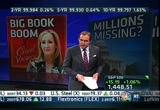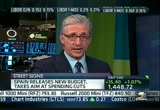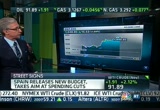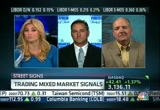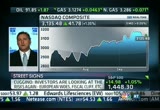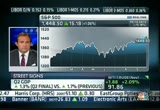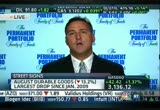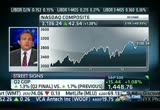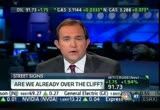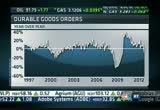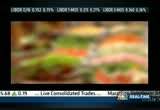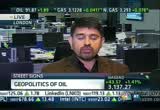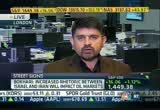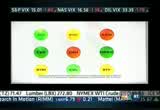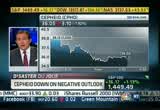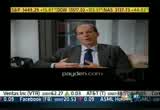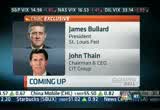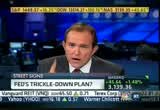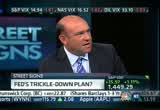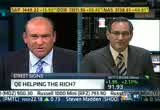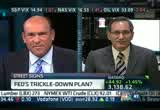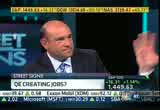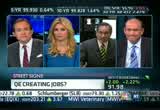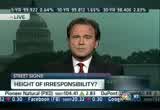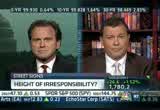tv Street Signs CNBC September 27, 2012 2:00pm-3:00pm EDT
2:00 pm
miss. and the big book boom. why j.k. rowling is oh, so important to the u.s. economy. >> okay. well, let's move on and take a look at what's happening in the markets. and it is all about breaking losing streaks on wall street today. the dow is on track to break a four-day skid. and with today's gains at least major averages with a better than 3% gain for september. so far. the s&p 500 is riding a five-day losing streak. but does appear to be setting to break that today. however, both the s&p and the nasdaq, even with today's possession, are on track for their biggest weekly drops in nearly four months. brian? >> all right, mandy, thank you. meantime, the violent protests continue in spain. today the government unveiling a new budget proposal to try to bring down the nation's crippling deficit. in it a proposed $51 billion spending cut next year, including an average 12% cut in government ministerial spending, a freeze in public pay for the third consecutive year, and a new 20% tax on lottery winnings. now, it does give something to
2:01 pm
the people. protection for pensions. well, bob pisani just happened to get back from spain, and he sent out his always interesting morning notebook. bob, i loved this one in particular because you basically said that what we keep quoting as a jobless rate in spain may be bunk, that people are simply working under the table? >> yeah, i'll give you an example. 25% unemployment is what they're talking about. but i had a landlord in barcelona. rented an apartment for one week. they asked for the payment in cash. they didn't want a check, didn't want anything else. my point is the bars lonens don't necessarily believe that. i wasn't in madrid, but in barcelona they're gripped by their own kind of secession of the fever. they're thinking of reseeding -- or seceding from spain. it's crazy. i was there for this la mers festival. a celebration of all things regional, catalonian. they sing catalonian songs, wave catalonian flags. there's a lost people that move
2:02 pm
by in these giant outfits throughout the day. it's really a lot of fun. but it's turned into this big national thing or roorth regional thing for spain. meantime the guy at the center of this thing is artur moss. he's the catalonian premier. he's purk the sessionist thing that's creating a lot of problems for the central government. i bring it up because if you look at the s&p 500 we rallied in the middle of the day because spain announced a budget plan that was a little more austere than people thought. there were more spending cuts. and the dow actually rallied on that news, believe it or not. we saw the euro rallying as well. when the euro moves up, that usually helps our market. puts upward pressure on energy, material, and financial stocks. and indeed, brian, those are the stocks that moved up in the middle of the day. back to you. >> i think it's also worth noting, stnt, and i think you also pointed this out in your morning note, that everyone keeps talking about the faded rally and yet just put it in perspective for us. it's not really fading, is it? the fed's always there to backstop regardless. >> yeah, i left 11 days ago and the s&p was just shy of
2:03 pm
4 1/2-year highs. right now despite all this five-day decline, everyone is talking about, we're only 2% off of the 4 1/2-year highs. and the s&p is up 2 1/2% so far this month. supposedly a bad month. >> okay, bob, thank you as always for putting things just exactly where they need to be. well, are the markets operating as if literally nothing matters? we have unrest in the euro zone. we've just been talking about that. disappointing economic data here at home. and yet we're trading higher. how do we interpret these mixed signals? joining us now is michael cuggino, president of permanent portfolio fund, and charlie smith, c.i.o. fort pitt capital group. great to have you with us. michael, you want to get to you first of all because you say the mood has darkened over the last week and we've even bouggot a n worry to worry about and yet i'm just wondering does that matter to my point to bob piz pisani? the fed's there to help out, right? >> well, the fed is definitely there to help. i think you have to caveat everything by saying the last week of trading in any quarter is what suspect for trend
2:04 pm
analysis only because you have a lot of people positioning portfolios. but the mood had darkened in the last week, today notwithstanding. as i think investors are starting to rethink about the upcoming elections. the news out of europe was negative. the fiscal cliff issues are still there. and investors after the qe-3 run-up earlier in the month were starting to digest some of this longer term economic activity. and you have q3 profits on the horizon, which we have had some preannouncements like fedex last week, that if if we get a lot more of those that's going to dampen the outlook for q3 earnings and potentially the q4 and 2013. >> if i can play the 2k68's advocate here, a lot of the worries you've just outlined, we've had those on the table for a number of months, right? and during those months we've still managed to shrug them off and not climb that wall of worry. if you had k4r50i78d that wall of worry, you would have missed out on a pretty decent rally. >> i agree. and i think the longer-term trend for equities is somewhat favorable because i think earnings are still supporting a
2:05 pm
reasonable multiple and dividend yields are supported by earnings. but investors have ebbed and flowed with their behavior based on short-term news throughout this longer rally that we've had. and i think the last week or so was just a short-term maybe more bearish look at some of the news out there than previous. >> charlie, i was digging through your fort pitt capital total return fund holdings. as of the last holding date you were big in defensive names like verizon, at&t, and our parent company, comcast. are you still? >> yes, definitely. we're still playing the steady eddie type companies with solid cash flows. if you look at the percentage of the household budget that's flowing to wireless expenditures versus dining out and entertainment, it's growing. so people are -- in our society if you don't have a cell phone you almost don't exist. and people will pay almost anything to keep their cell phones and their data plans. >> great point. in fact, there was an article about how now most families are spending $1,200 a year on their smartphone. that said, are those plays on telecom or are they defensive
2:06 pm
because you're nervous about the economy? >> they can be a little bit of both. if you've got a sector that's perceived as defensive with a 4 1/2% or 5% dividend yield but it actually has a growth component to it, you can play both sides of the highway that way. >> i want to ask you, michael, what you would be doing with your money if i came to you today and said we're going into the fourth quarter. what do i do right now? >> i still worry about the uncertainties. as you know, we run a pretty diversified portfolio. i would have some money in precious metals like gold to guard against long-term inflation and risk to the financial system p i would have some money in equities. more growth-oriented equities than more of the defensive names. but those growth equities that have supportable dividends. and are leveraged toward future economic growth. and i would have some money in bonds to guard against inflation, recession, double dip, worries about a fiscal cliff and a recession that could cause and some of those issues we really have a lot of uncertainty at this point. >> for those of you watching at
2:07 pm
home and think you want us to go into growth-orientated stocks. also the recent economic data like the durable goods today. are we sliding backwards economically speaking? >> we're longer-term investors. i view it as longer-term opportunities. some of the defensive names have run up quite a bit for a lot of reasons that were given. so there's some opportunity in some of the more leveraged, higher-growth, higher beta, higher volatility types of names out there. >> does that mean -- we'll get back to you in a second, but i want to follow up with you, michael on that. are you selling some of the miners? i know you like b.h.p. billiton. you had some real estate holdings. are you dumping those for higher tech names? >> we've trimmed some of our natural resource names recently in the refining area. but no, it doesn't mean we're wholesale getting rid of commodities because i think a lot of the negative news has been priced into commodities already and they're presenting some very interesting longer-term risk-reward profiles. >> and charlie, give us a few names that you're looking at
2:08 pm
specifically. >> on the cyclical side of the economy we still believe in aerospace. the durable goods number showed a significant decline in commercial aircraft orders in august. those tend to be very, very lumpy anyway. we like avionics, names like a honeywell, boeing, ge in the jet engine ya & natural gas turbine area. we do have a portion of the portfolio that's leveraged to at least a decent economy. >> michael and charlie, thank you so much for joining us today. well, america officially hits the fiscal cliff on december 31st, right? happy new year. but we may have already hit it. look at what is going on economically lately. gdp was revised down. durable goods orders, to mandy's point, post aid giant drop, in fact the biggest dm years. pending home sales were weaker than expected. and corporate earnings growth is slowing. all this just happening, folks, in the last couple days and weeks. let us bring in chris logan,
2:09 pm
chief economist at f.t. financial. in your morning note you pointed out something that scared the bejesus out of me, which is this. civilian aircraft orders fell 100.2%, meaning there were more cancellations than orders. should we be scared? >> yeah, that was a real eye opener to me. when you see anything down more than 100%. it looks like this was a combination of a one-off. qantas, they canceled 34 planes from boeing. so it was a one-time thing. but behind that is emerging weakness. it's a combination of the slowdown in emerging markets, the biggest buyer of planes in the last couple of years is emirates air. they're pulling back a little bit. it's fiscal cliff concerns here in the u.s. airlines are a highly cyclical industry. you don't want to make a huge investment there right before we maybe having recession -- >> but chris, not to cut you off, but mandy had plucked something out of the news about
2:10 pm
a week or two ago, which is that 25% of those surveyed said they're going to put off a big purchase, a home, a car, whatever, ahead of the election because they simply didn't know what was going do happen. why wouldn't corporate america do the same thing? >> oh, i think corporations are more likely to make that kind of decision than individuals. and i can tell you, i've spoken at bank conferences the last couple of months where board members have dozens of banks have told me this is very much part of their planning. i don't think there's any question about it. the cbo has told us we will have a recession if congress doesn't work together. and this congress hasn't been able to work together for years. >> if the fed didn't do anything, maybe congress would be forced to pull their finger out. but i want to ask you, chris, anyone who's still out there, who's voicing perhaps that there wasn't any need for qe-3, are they to a certain extent starting to be silenced now by some of the data coming out?
2:11 pm
>> i don't know. we actually heard from a few of the fed officials just this week. guys like james bullard saying it's not going to work. and i think that's the critical distinction. it's not that we don't need help from the fed. it's that maybe help from the fed doesn't produce jobs. and i'd say the jury is still out on that. we saw a little bit of economic impact from qes 1 and 2, but as soon as the programs ended the economy got weaker within just a few months. so i think they may have a valid point. we really do need something on the fiscal side if we can get it. >> we're going to have a conversation later on in this show, chris, about whether or not what the fed is doing is really only helping the haves already, for example, those who can already refinance, for example. just one example. would you agree with that? that it's not really helping those who have not right now. >> i would say that's true in the short term. but the reality is mortgage banking is profitable again and what that means is companies are
2:12 pm
hiring, they're expanding, the pipeline's getting bigger, that will eventually bring costs down. that's going to bring more people to the table, too. and we've also had home price increases for six months. that means marginally fewer people underwater. but every month those prices go up there will be more people participating. so i think the answer to that one is we just have to give it a few months. >> let's hope we have a few months. chris low, ftn financial. thank you very much. >> thank you. >> tick-tock, tick-tock. thank you very much. let's get a market flash from jackie deangelis. what are you watching? >> hi mandy. shares of eagle materials, they're popping nearly 10% today. the company offering nearly 3 million shares to help fund that acquisition of lafarge'sing agate cement and concrete businesses, those activities in missouri and oklahoma. eagle is saying the $46 million beal is going to allow it to benefit full grit construction recovery in the u.s. shareholders are liking that. both stocks are higher. back over to you. >> jackie, thank you.
2:13 pm
the iran oil factor. why some strong words at the united nations today could send pump prices higher in the future. and how to arbitrate for that potential spike. ahead. . later on, the next "harry potter"? j.k. rowling is out with a new book. why it could be a big boon for the u.s. economy. stick around. for over 60,000 california foster children,
2:15 pm
extra curricular activities help provide a sense of identity and a path to success. joining the soccer team. getting help with math. going to prom. i want to learn to swim. it's hard to feel normal, when you can't do the normal things. to help, sleep train is collecting donations for the extra activities that, for most kids, are a normal part of growing up. not everyone can be a foster parent... but anyone can help a foster child. israeli prime minister benjamin netanyahu has just finished addressing the u.n., and here is what is making news right now. netanyahu just said iran will have enough enriched uranium to
2:16 pm
build a bomb by next summer. and he says the world must set a clear "red line" that iran cannot be allowed to cross in its quest for nuclear weapons. of course this is the big political story of the day. but you'd better believe it is something the oil traders are watching very closely as well and could really move those markets. so let's get straight to sharon epperson at the nymex. are you seeing any reaction in the oil markets so far, sharon? >> well, mandy, we've been seeing a reaction all day because we knew earlier this morning that netanyahu was going to talk about the fact that he was going to set a clear red line when it came to iran's nuclear ambitions. and that sent oil prices back above $91 a barrel. and of course we'd already seen oil prices recover from yesterday's low after iran's president ahmadinejad also spoke before the u.n. general assembly. it is this rhetoric between israel and iran that is certainly supporting prices here p we have brent crude prices above $112 a barrel, near the highs of the session. and the fact remains that if we
2:17 pm
do see israel have an attack on iran that's going to send prices spiking. the question is for how long and how far they will go. there are some traders who say we could see the highest prices on record, and others say that we may see a spike but then we may see a quick decline if we continue to get weak economic data about the demand picture. so how do you play this? well, jpmorgan says traders really need to be hedging their bets here. whether it's in the options market or perhaps going for the crack spreads. and they're looking specifically at the gasoline crack spreads. we've noticed gasoline prices at the highest level we've seen since april, and the tight supply picture help lift gasoline prices. but those crack spreads are benefiting quite nicely, up about 25% in the last week, so looks like some traders may have been heeding that call. back to you. >> sharon, thank you. so is crude oil at a geopolitical tipping point? let's ask kari, vice president of eastern and asian affairs at the research firm strat4.
2:18 pm
all right, kamran, some strong words from netanyahu. and it appears if he is right about the ability to enrich enough uranium to build a bomb next year that we are coming upon some kind of deadline. >> well, i think that this is a cyclical issue. anytime there are statements from heads of state. and usually it happens -- in this case it happens around the united nations general assembly session in the fall, beginning of fall. so we see this reaction from the market. it's largely psychological. but then again, at some point this rhetoric becomes routine and the market just doesn't seem amused. but that said -- >> good point, kamran. is this time routine? nothing new between the friction between these countries. but is it different now or the same? >> the rhetoric is not different, and neither is the reaction of the market. so what i see different is that this time around we've had some unusual statements coming from
2:19 pm
pretty much the who's who of the iranian military hierarchy, basically warning israel of a tough response in the event of an attack on the islamic republic. and that's something that caught our eye at stratforand i think has more significance than the usual rhetoric from the political leadership in both capitals. >> realistically speaking, though, kamran, do you believe that israel has the capability to be able to neutralize any of iran's nuclear intentions anyway? >> well, there are two things here. first is the question of whether israel can launch a strike. yes, it definitely can. but then the next question is much more important. how successfully? and in that regard we at stratfor don't believe that israel has that wherewithal to go it alone and successfully neutralize the iranian nuclear capability. and there -- >> so what are the options? >> well, the options are either diplomacy or hope. and i'm speaking from the
2:20 pm
israeli point of view. that diplomacy will work, that the u.s. is engaged with, or that the u.s. will, when the time comes, take that military action itself. >> and what would happen to oil prices if there was that military strike? >> i think oil prices would go sky high. but that's not going to be the only problem that the region and the world will be facing. we'll have a massive reaction. if we're worried about, you know, reactions in the light of the anti-islamic film in recent weeks, then one could only basically imagine what would happen if iran is attacked and we see this -- >> even though we dent get directly in iranian oil. they export a lot but not to us. >> well, it's not going to be just oil, as i said earlier. there is going to be the reaction in the oil markets. the price of oil will go up. but there will also be enhanced insecurity in the region, unrest. which is something that u.s. officials are already talking about and letting the israelis
2:21 pm
know that the risks of such a course of action. >> kamran bokhari, thank you very much for joining us. he with appreciate it. >> jackie d. with the market flash. jackie. >> the stock on the move is general electric. actually seeing a spike right now. organic revenue growth for the company on the industrial side looking at 10%. the prior forecast was between 5% and 10%. this is coming from the ceo. he's speaking at the company's infrastructure investor meeting today. also saying that they're interested in acquiring big underground mining companies. so we'll be watching for that. and remember of course that ge is a minority owner of cnbc's parent company, nbc universal. guys? >> all right, jackie, thank you. well, is trickle-down economics alive and well? why the fed's free money policy is working if you're one of the lucky few. but first, you want to know what's really driving our economy? rvs. we're going to tell you why when "street signs" comes back.
2:22 pm
with the fidelity stock screener, you can try strategies from independent experts and see what criteria they use. such as a 5% yield on dividend-paying stocks. then you can customize the strategies and narrow down to exactly those stocks you want to follow. i'm mark allen of fidelity investments. the expert strategies feature is one more innovative reason serious investors are choosing fidelity. now get 200 free trades when you open an account. syou know, i've helped a lot off people save a lot of money. but today...( sfx: loud noise of large metal object hitting the ground) things have been a little strange. (sfx: sound of piano smashing) roadrunner: meep meep. meep meep?
2:23 pm
(sfx: loud thud sound) what a strange place. geico®. fifteen minutes could save you fifteen percent or more on car insurance. the economy needs manufacturing. machines, tools, people making stuff. companies have to invest in making things. infrastructure, construction, production. we need it now more than ever. chevron's putting more than $8 billion dollars back in the u.s. economy this year. in pipes, cement, steel, jobs, energy. we need to get the wheels turning. i'm proud of that. making real things... for real. ...that make a real difference. ♪
2:24 pm
2:25 pm
nasdaq is up 1 1/2% almost. and the s&p's doing pretty well as well. and we sort of started to get a real kick up when spain announced its detailed timetable for economic reforms. also a tough 2013 budget. and as bob pisani was detailing, the euro was helped by that as well. euro and s&p often go hand in hand. >> well, it's not all good news today, folks. i thought i'd play the role of herb and bring in the disaster du jour. and that is brought to you by a company called cephi. shares of the company down 7%, almost 8% on the day. company saying third quarter revenue will fall short of estimates. the stock is down 4% year to date. >> let's add some sunshine to that. rvs, they're hot again apparently. four industries love that name ticker t.h.o. soaring after reporting fiscal third quarter profit seven seven cents above estimates. those sales also beat on double-digit sales growth. thor industries, by the way, is up about 32% year to date,
2:26 pm
brian. >> well, when we come back, herb is back. and he is fired up over a stock trifecta. we're going to name names. >> glad herb is back in the fray. first, though, we are heading to the mattresses. why sealy and tem purchapurpedi driving today's markets. americans believe they should be in charge of their own future. how they'll live tomorrow. for more than 116 years, ameriprise financial has worked for their clients' futures. helping millions of americans retire on their terms.
2:27 pm
2:29 pm
it is "street talk" time, everybody. let's take a look at the first stock. among the many upgrades and downgrades we've been seeing today why don't we start with hewlett-packard, which has been downgraded to underperform? jeffries. >> if you want to find a silver lining in hewlett-packard, i guess the fact that it's not down is the news, right? >> right. >> they cut their target to 17. so they see exactly zero upside. maybe 15 cents of down side. but here's the thing, right? they're bashing hp, saying they're going to have after the smartphone and tablet markets, which jeffries thinks is a risky move. jim chanos calling this the ultimate value trapper. whatever. the point is hp has not been whacked on this news. i tell you, i just want to throw something new into street talk, by the way. hp is sort of a mini ibm in some
2:30 pm
ways. of course they've got more hardware. look at the value of asset light. the green is ibm. the white is hp. that's a five-year chart. >> can't get a more stark difference than that. >> that's about right where ibm sold lenovo. >> right. >> asset light, folks. look what ibm did. >> over five years. yahoo staying with the tech theme is also moving higher today. goldman sachs says it is a buy. >> yeah. and goldman saying the appointment of marisa meyer and the value of yahoo japan are big for the company. they add that the value of the balance sheet and core business are worth more than the stock price. so goldman positive again on yahoo. that stock up 3 with a repeater over. >> monsanto is also a company that's trading higher today after its upgrade to outperform by wells fargo. >> yeah, wells fargo upgrading monsanto following meetings with the company management. wells fargo saying it is more optimistic that most of the challenges are behind the company, especially challenges in china. they raised their estimate and
2:31 pm
price target to about $104 to $106 range. they don't give a number. they give a range. but that would still be about a 15% to 17 prs gain from these prices. monsanto has nearly doubled off its july 2010 low. >> incredible. well, shares of goodyear tire are burning rubber, excuse the terrible pun. they're up, as we can see, about 3.5% after getting upgraded by goldman sachs again. goldman sachs getting out its little pun today. >> and your pun is de234r5flati. >> it's terrible. you ran over me with that one. >> goldman sachs upgrading goodyear to a buy from neutral, sees neutral tail winds that will boost operating income including a surge in tire replacement demand. goodyear actually kind of quietly is up 17% over the past year, although let's not forget this was more than a $20 stock just four years ago. so the akron-based company -- the rubber factory, black keys. >> it nonetheless has been having a goodyear. tempur-pedic over its rival
2:32 pm
mattress maker sealy. i think hs a stock that requires the presence of sir herbert greenberg. >> as soon as i walk in this morning i see this guy rirlt ity runs across -- i come into cnbc in my pajamas because i keep my suits here. you were so excited -- why are you upset about this deal? >> look, this is telling you in the way i look at this, that tempur-pedic is basically saying their base business, the business they did so well ex-kueth on with the visco -- the tempur-pedic mattress, it's maturing, they need another way to grow. and what are they doing? they're buying a $1.2 billion company that has no profits. a $1.2 billion profitless company. and as i tweeted out this morning, this is really a win. even though tempur-pedic's stock really up a lot on thuf to see where it's come, from it's still down from their old rise, the big winner kkr, which owns 44% p company pu and i were talking about. kyle bass's investment company.
2:33 pm
>> just last week. >> just last week. because this was such a beaten down stock. kkr, my gosh, did they take a bath on this thing. >> can i ask you about the debt issue? because tempur-pedic is taking on about $750 million in debt through this acquisition, right? hasn't the current ceo been absolutely intent on driving down its leverage? >> well, i think what you've got here now -- yeah. but now they have this opportunity. but they say it will take another, say, four years for all of this to settle out. four years is a long time. we'll see how it washes out. we'll see what investors think. >> we've got to move on because actually our graphics and our banners are way ahead of us. now we've moved on apparently to a company called blyth. >> apparently called blyth. i was on a few weeks talking about it. it's a direct marketing company, seller of candles. >> and other home scent products. >> other home scent products. it was the spinoff that they were going to do of their multilevel marketing unit called vysalus. it's sort of weight loss shakes,
2:34 pm
nutritional supplements, sort of a -- >> skin cream, the easy comfort line of facial products. for the silver foxes. such as yourself, sir. >> this is a company that had a spectacular rise in sales over a very short period of time. i did a little piece on cnbc.com at the time. i said beware of this get rich quick ipo. the ipo yesterday was pulled. the company cited market conditions. what i want to know is what's the real story? >> i would never have called you a silver fox. but now that we mention it -- >> by the way, you live in connecticut. they are based in connecticut. tonight. and they have the directions to their hq on their website. make a little stop. stop by. herb greefrnberg. i'm sure they'll welcome you in with open arms. >> going to have a little martini in greenwich. >> light a few candles. >> with some sandalwood scent in your -- what do you drive, a rolls or bentley? >> many candles now make man scents like cigars and i don't know, old spice. coming up next on "street signs," the fed making it rain
2:35 pm
on the rich. is the flood of cash only helping the upper crust? our big debate coming up next. >> and the cell phone indicator. most americans cutting back just about everywhere. the middle class, as we hear, is completely strapped. so why are most american families putting 1200 a year on their phones? bob, these projections... they're... optimistic. productivity up, costs down, time to market reduced... those are good things. upstairs, they will see fantasy. not fantasy... logistics. ups came in, analyzed our supply chain, inventory systems... ups?
2:36 pm
ups. not fantasy? who would have thought? i did. we did, bob. we did. got it. tdd#: 1-800-345-2550 at schwab, we're committed to offering you tdd#: 1-800-345-2550 low-cost investment options-- tdd#: 1-800-345-2550 like our exchange traded funds, or etfs tdd#: 1-800-345-2550 which now have the lowest tdd#: 1-800-345-2550 operating expenses tdd#: 1-800-345-2550 in their respective tdd#: 1-800-345-2550 lipper categories. tdd#: 1-800-345-2550 lower than spdr tdd#: 1-800-345-2550 tdd#: 1-800-345-2550 and even lower than vanguard. tdd#: 1-800-345-2550 tdd#: 1-800-345-2550 that means with schwab, tdd#: 1-800-345-2550 your portfolio has tdd#: 1-800-345-2550 a better chance to grow. tdd#: 1-800-345-2550 and you can trade all our etfs online, tdd#: 1-800-345-2550 commission-free, from your schwab account. tdd#: 1-800-345-2550 tdd#: 1-800-345-2550 so let's talk about saving money, tdd#: 1-800-345-2550 with schwab etfs. tdd#: 1-800-345-2550 schwab etfs now have the lowest operating expenses tdd#: 1-800-345-2550 in their respective lipper categories. tdd#: 1-800-345-2550 call 1-800-4schwab tdd#: 1-800-345-2550 or visit schwab.com tdd#: 1-800-345-2550 to open an account today. tdd#: 1-800-345-2550 funding is easy tdd#: 1-800-345-2550 with schwab mobile deposit. tdd#: 1-800-345-2550 investors should consider
2:37 pm
tdd#: 1-800-345-2550 carefully information tdd#: 1-800-345-2550 contained in the prospectus, tdd#: 1-800-345-2550 including investment objectives, tdd#: 1-800-345-2550 risks, charges, and expenses. you can obtain tdd#: 1-800-345-2550 a prospectus by visiting tdd#: 1-800-345-2550 www.schwab.com/schwabetfs. tdd#: 1-800-345-2550 please read the prospectus tdd#: 1-800-345-2550 carefully before investing. tdd#: 1-800-345-2550
2:38 pm
i'm bill griffen. coming up on "closing bell," more reaction to israeli prime minister netanyahu's comments at the u.n. and what it means for the oil markets, which are skyrocketing today. plus, is today's weak second quarter gdp report another major red flag about the state of the u.s. economy? st. louis fed president james bullard weighs in for us exclusively, coming up. and is c.i.t. group ceo john thain looking to shop his company around to interested buyers? maria will ask him. another exclusive sit-down coming up. maria looking forward to seeing you trt new york stock exchange here at the top of the hour on "closing bell." back to you guys. mandy? >> thanks so much. we're looking forward to it. do you feel like your cell phone bill just keeps on going up? well, it is. the amount of money a typical u.s. household spends on cell phone service jumped 4% last year. that is the fastest growth rate in seven years. the labor department says americans spent an average of $1,226 for mobile services in
2:39 pm
2011. the obvious wirpz, we've got some of them up there in front of you. the carriers. yep. and they are, by the way, also trading in the green today. brian? >> well, let's talk about the federal reserve. right? because in a new ad the president sort of pokes fun at so-called trickle-down economics. right? kind of just saying, eh, pooh-poohing it, doesn't really exist. however, think about what the federal reserve is doing, folks. right? they're lowering rates so that people who have assets, i.e. homes, they can refinance, cars they can purchase, and stocks that will go up are getting wealthier in the hope that those savings on interest rates will then trickle down through the rest of the economy. is that true? let's bring in rick santelli and steve liesman. steve, first to you. i say the fed is practicing trickle-down economics. what say you? >> i say you can't have it both ways. my good friend and colleague rick santelli's going to complain that the federal reserve has really hurt savers in this world today, right? okay. so who are the opposite of
2:40 pm
savers? borrowers. if you're helping savers, you can't be -- you have to be hurting borrowers. so it's actually the other way around. they're hurting savers. they're hurting people who are clipping a coupon. >> no, no, no. if my mortgage is 3,000 a month, right? and then i refi and now it's $2,600 a month or whatever it is. >> right. >> the fed is hoping i take that 400 i've just saved -- >> right. >> -- and exchange it for goods and services that i reckon will at some point trickle down through more moving or whatever. that, my friend, is trickle-down economics. >> but what if your mortgage is $1,000 a month and you just saved $200 a month? you've just helped you who's saving $200 a month. what's wrong with that? why is that trickle-down? >> well, what say you, good friend and colleague rick santelli? >> well, first of all, i think that you can have a mutually exclusive argument here where you're hurting savers and not helping borrowers. and my evidence of that is to look at the excess reserves that banks are carrying. i believe it's about 1.8 trillion. so the problem with the whole trickle-down theory and the
2:41 pm
problem that it's going to help borrowers is is that this little thing called a transmission pipe is broken. the fed keeps pouring all the water there, but not enough is coming out the other end. it really is a trickle. because it's all clogged up in excess reserves. a hugely flawed part of the strategy. >> no, but rick, excess reserves is a by-product of a program the federal reserve has which is to lower rates. and lowering rates has to help people who are borrowers. by definition more middle-class people and lower middle-class people and poor people are borrowers than they are savers. and so to the extent that the federal reserve is lowering rates it's hurting savers and trying to help borrowers and by definition that would accrue, it would be one of the few ways the federal reserve could help out middle-class people. >> i would argue, though, that any -- >> it sounds -- >> hold on. let me play rick santelli for a minute, rick, and then you can respond yourself. >> make sure you gesticulate. >> ah! i will. i always do anyway. i will argue that any savings that poor people would have or any benefit they get is killed
2:42 pm
by the inflationary aspects to gasoline and food which are extremely regressive costs. >> and those you assure are direct results from quantitative easing? >> they're there. >> i agree with you. you said it well. >> if it's from quantitative easing and the net effects of inflation of quantitative easing is to wipe out any gains to aggregate demand i agree with you. i just don't think all of it comes from what's happening with qe. look what's happened to oil prices since the fed acted. look what's happened to other prices. grain prices have come down. so i think that's a major issue that you have to sort of be more sure about if you're going to make that case. and by the way, you changed your argument in mid-sentence. >> you just -- >> whoa, whoa. you just accused me of changing my argument? >> you changed your argument entirely. you began by talking about how it was trickle-down, that was the problem with the -- then you're saying it's eroding whatever benefits are there because of inflation. that's an entirely different argument. >> i was responding to your comment about the benefit to the lower -- >> but what happened to the first argument on trickle-down? >> i'd like to bring it back
2:43 pm
somehow. >> then let's go. you lost that argument. that's why you moved on. >> what about the ultimate trickle-down? qe-3 supposedly getting us more jobs. what about that? >> okay. so let's talk about that. i think that's interesting. i think it's not the best tool for creating jobs. i think a lot of the best tools for creating jobs are probably on the fiscal side. but you and i both know what congress and the president have been up to these days, which is almost absolutely nothing in terms of being able to pass anything from washington. so what tools are out there? the fed has a serious of blunt tools. it can buy treasuries. it can buy mortgages. that's about all it can do. >> i agree. let's get even more -- >> and the housing business. >> let's get even more granular to steve's point here. the president of the united states in an ad pokes fun at so-called trickle-down economics, calls it the failed trickle-down policies, basically says that the government -- that the economy shouldn't go from the rich down. but yet when i look at the fed action, rick, a fed not controlled by the president of the united states but at least still in washington, d.c. with a chairman appointed by the president of the united states
2:44 pm
in large part, right? that their policies are in effect benefiting the wealthy, right? in the hope that the savings from lower rates will trickle down and create jobs. so you've got the president slamming it over here and the fed practicing it over here. and i'm just trying to -- >> sully, that's not it, though. >> -- point out what i think is a giant contradiction. >> time out. >> i did sound like you. >> you did. but i'll summarize. you know, steve, you're eloquent, but i want to really cut to it. here's what i see. i see a strategy that was meant to throw all this money into the banks so it did trickle down. >> no, rick. >> which wouldn't be bad. but it isn't working. >> no. >> and one of the reasons -- wait a minute. let me finish. >> that's not true. >> they're paying a quarter of a point for excess reserve interest, which even shows how outrageously disconnected they are from reality. they have an interest rate that's basically undermining their own strategy. the whole thing is flawed. and when you said, well, it's the only entity that's doing
2:45 pm
anything, i say if my doctor is out of the office i'm still not going to go to somebody in an alley with leaches. >> well, if you're bleeding i think you might go to somebody. anybody who can put a tourniquet on, rick. but that's a strained metaphor right there on my part. but let me just make the point here. if you can help out the construction business, if you can help out home prices, what happens when home prices rise? >> but they're not. >> well, fewer people are then underwater. in fact, core logic says some 600,000 people i believe in the last quarter, in the second quarter, were no longer underwater. part of that has to do with rising home prices. that's what happens. if that happens, sully, then you can have those people refinance if their homes are no longer underwater. if home prices have a floor underneath them, banks will be more likely to lend. it's not -- >> that's a good point. i just hope the policy dozen benefit those that are not just -- >> i want to make a point here. who are the people who are net savers? okay? they tend to be wealthy people. even if they have a large mortgage and get a large benefit, they probably also have
2:46 pm
a large pension and they're taking it on the savings side as well. >> what about all the retired people that aren't -- >> i'm going to say time out, gentlemen. >> does that mean we get to come back or just the end of the game? >> you get to come back. >> so it's not a time out. you're saying the game's over. >> good-bye. >> we have more things to talk about. >> we have many more things to talk about. including rich people. speaking of rich people, joining us is cnbc wealth reporter robert frank. how are you? you weigh in on this one. >> yeah, i'm glad. first of all, brian, this is such an important debate, and you raised a really important -- i just want to inject one -- >> you're welcome. anytime. >> -- one very good fact. which is the top 1% -- steve doesn't want to hear this, but the top 1% of americans own more than 880 of the stocks and bond held individually in this company. it is boosting financial assets and value of assets. let's face it. fortunately or unfortunately, the top 1% own the disproportionate share of assets in this country. we can talk about savers, we can talk about borrowing, but that's
2:47 pm
the real issue. i'll just leave it at that. >> we also want to get to one of the very, very rich people out there who must be also feeling pretty good about herself, which is j.k. rowling as well, right? >> and she's a writer. so yay, writers. yay, billionaire writers. >> they are out there. >> she writes checks at this point. you know, she's sold 400 katrillion books of the "harry potter" series. coming out with a new book now, printed 2 million copies. a lot of debate over why is she doing this? once you've made a billion dollars, why do you keep going? i just want to cite another statistic, another study. the study showed people worth 15 million or more, 60% of them wanted to keep working even after they had made their target number. so people -- >> because they don't want to be bored or they want to feel relevant still, contributing? >> because it's what drives them. >> it's how they got there probably. unless their last name is walton. you know what i mean? >> exactly. when you look at the wealthy a lot of them think once i get this number i'll be done, i'll stop working.
2:48 pm
they get there and they realize what's driven them all their life is creating jobs, starting companies, disrupting the economy, creating something new of value, and they don't stop. and the same thing is true for writers. and i think good for her for keeping writing despite her success. >> and of course she's branching out into adult fiction as well. i don't mean adult adult. but like as in -- >> no shades of grey from her yet. >> right. did want to clarify on that. >> what's the book about? >> go read it. another market flash from jackie d. >> thanks, mandy. well, take a look at the chart of joy global. we did see some movement on those comments that we talked about coming from the ge conference on m & a. ceo jeff immelt said the acquisition strategy is to focus on pure plays, that they're interested in acquiring a big underground mining company. some saying it could be this one. and you can see there we are. up 1% on the day. but it did move on those comments. brian? >> all right, jackie, thank you. government waste gone wild. the shocking story that has all of us here shaking our heads today. >> indeed. and how the lands down under just got a whole lot richer.
2:49 pm
why am i not there? "street signs" is back after this quick break. here's today's "return on retirement." middle-class americans are dealing with some serious woes. their net worth has fallen, wiping out two decades of growth. in a recent survey, 85% of middle class adults said it is harder to maintain their lifestyle today than a decade ago. so how do they feel about retirement? the results when we return. i've been a superintendent for 30 some years at many different park service units across the united states. the only time i've ever had a break is when i was on maternity leave. i have retired from doing this one thing that i loved. now, i'm going to be able to have the time to explore something different. it's like another chapter.
2:50 pm
now we need a little bit more... a little bit more vanilla? this is great! [ male announcer ] at humana, we believe there's never been a better time to share your passions... because the results... are you having fun doing this? yeah. that's a very nice cake! [ male announcer ] well, you can't beat them. [ giggles ] ohh! you got something huh? whoa... [ male announcer ] humana understands the value of spending time together that's a lot of work getting that one in! let's go see the birdies. [ male announcer ] one on one, sharing what you know. let's do it grandpa. that's why humana agents will sit down with you, to listen and understand what's important to you. it's how we help you choose the right humana medicare plan for you. because when your medicare is taken care of, you can spend more time sharing your passions. wow. [ giggles ] [ male announcer ] with the people who matter most. i love you grandpa!
2:52 pm
today's "return on retirement." what percent of middle classere have enough money to last throughout retirement? 23% according to the pew research center. for more, go to retirement.cnbc.com. now to our outrage of the day if that previous outrage wasn't good enough. a new report shows dozens of federal agencies have millions
2:53 pm
in unpaid taxes. this really is an outrage, if the headline is what it is. >> yeah, it is what it is, mandy. here's the report out this morning from the inspector general for the irs. in this report they say that federal government agencies haven't been paying their taxes. take a look at the specific findings here. you see that 70 federal agencies have 126 delinquent tax accounts. they say those agencies owe $14 million in back taxes and that 18 federal agencies have not filed or are delinquent in filing. the conclusion of this report, mandy, is kind of obvious, i guess. it says federal agencies should be held to the same filing and paying standards as all american taxpayers. i think a lot of our viewers might agree with that. the feds here not paying their taxes, guys. that's the news out of washington. >> more good news from d.c. thank you.
2:54 pm
all right. so is this just the height of government waste? joining us is scott hodge and julian epstein. scott, your reaction. i know it's not a big sum of money, but come on. >> well, the basic responsibility of every employer is to pay the taxes on behalf of their employees. you can be subject to fines or liens or property seizure if you don't do it. these federal government agencies are getting away with murder here and not paying the taxes. there's really nothing the irs can do. this is a basic responsibility. they're fumbling the ball badly on this. >> it really feels like maybe the government is setting a bad example, right? >> terrible example. >> and scott, is there any way to penalize them? >> no. >> apart from hiring more people to look into it and do something about it? >> no, in fact, the report doesn't even list the agencies. we can't even humiliate them because they've redacted the names of the agencies here. so they're even hiding that element of it. so this is a real travesty. taxpayers ought to be awfully
2:55 pm
frustrated. >> julian, do you agree with this? >> yeah, taxpayers should be frustrated. this is a problem that clearly needs to be fixed. let's be clear to your viewers about what we're talking about. federal agencies like every other employer have to withhold the taxes of their employees and remit them to the department of the treasury. what this report found is 70 agencies are not fully doing that to the tune of $14 million. when you look at a $3.6 trillion budget, it's a small figure. still, it's a lot of money, and it's a problem that ought to be fixed. what you didn't say in the setup piece and the question was this is a problem that's gone on for many, many years. a report in 2007 found this. >> we're not blaming obama. it's not a party thing. get your own house in order, right? >> you're missing my point. >> what is your point? >> my point is that this is a problem that goes back into the 1980s and the 1990s. the obama administration -- i know you're not trying to be political here. the obama administration has put in place a number of procedures to try and fix this.
2:56 pm
the oig report recognizes that. many of the problems identified in 2007 are, in fact, being implemented, but they haven't been fully implemented. they ought to be. if we're looking for area where is the taxpayers are getting the shaft here, this has been pointed out on this show. you look at the ability to shelter money in places like the caymen islands. taxpayers are losing billions of dollars a year because of these shady taxpayers that the irs can't get information about. >> so it looks like it's nothing new, which is even sadder, really. scott and julian, got to go but thank you so much for joining us. interesting stories. up next, the ozzie windfall. [ male announcer ] when a major hospital
2:57 pm
wanted to provide better employee benefits while balancing the company's bottom line, their very first word was... [ to the tune of "lullaby and good night" ] ♪ af-lac ♪ aflac [ male announcer ] find out more at... [ duck ] aflac! [ male announcer ] ...forbusiness.com. [ yawning sound ] oh, hey alex. just picking up some, brochures, posters copies of my acceptance speech. great! it's always good to have a backup plan, in case i get hit by a meteor. wow, your hair looks great. didn't realize they did photoshop here. hey, good call on those mugs. can't let 'em see what you're drinking. you know, i'm glad we're both running a nice, clean race.
2:58 pm
no need to get nasty. here's your "honk if you had an affair with taylor" yard sign. looks good. [ male announcer ] fedex office. now save 50% on banners. [ male announcer ] introducing a reason to look twice. the entirely new lexus es and the first-ever es hybrid. this is the pursuit of perfection.
2:59 pm
we had a fabulous australian story for you. we've run out of time, but i'm going to tweet it out. >> thanks for watching. "closing bell" starts right now. hi, everybody. we enter the final stretch. welcome to the "closing bell." i'm maria bartiromo. we're at new york stock exchange. forget the four-day losing streak. we're back in rocking mode. >> off of the best levels. i'm bill griffeth. today's sharp rally adding more fuel to the september fire. we've been talking about how the dow is up 3% this month, but it happens to be historically one of the worst months for
79 Views
IN COLLECTIONS
CNBC Television Archive
Television Archive  Television Archive News Search Service
Television Archive News Search Service 
Uploaded by TV Archive on

 Live Music Archive
Live Music Archive Librivox Free Audio
Librivox Free Audio Metropolitan Museum
Metropolitan Museum Cleveland Museum of Art
Cleveland Museum of Art Internet Arcade
Internet Arcade Console Living Room
Console Living Room Books to Borrow
Books to Borrow Open Library
Open Library TV News
TV News Understanding 9/11
Understanding 9/11